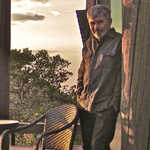“Lost really has two disparate meanings. Losing things is about the familiar falling away, getting lost is about the unfamiliar appearing. There are objects and people that disappear from your sight or knowledge or possession; you lose a bracelet, a friend, the key. You still know where you are. Everything is familiar except that there is one item less, one missing element. Or you get lost, in which case the world has become larger than your knowledge of it. Either way, there is a loss of control.
Imagine yourself streaming through time shedding gloves, umbrellas, wrenches, books, friends, homes, names. This is what the view looks like if you take a rear-facing seat on the train. Looking forward you constantly acquire moments of arrival, moments of realization, moments of discovery. The wind blows your hair back and you are greeted by what you have never seen before. The material falls away in onrushing experience. It peels off like skin from a molting snake.
Of course to forget the past is to lose the sense of loss that is also memory of an absent richness and a set of clues to navigate the present by; the art is not one of forgetting but letting go. And when everything else is gone, you can be rich in loss.” ― Rebecca Solnit, A Field Guide to Getting Lost
Filed Under
Other moments in Vancouver
-
vancouver, Photos, my life in a sea of photos
Is this what we are? Our photos turn our lives into just a bunch of colours on somebody's infographic?
in Vancouver, Canada -
storytelling, pets
Eliza sat down to type a story
in Vancouver, Canada -
Food, Summer Night
These the happiest moments in the day
in Vancouver, Canada -
postcards, A new day, Happy Things
2016 is half way beginning!
in Vancouver, Canada -
summer, Ocean, happy place
The ocean has always been my happy place
in Vancouver, Canada -
Death, summer
Goodbye May
in Vancouver, Canada -
Travel, Writers, romance
For the rest of us, it’s a bit less romantic
in Vancouver, Canada -
Travel, Writers, Dating
Date A Girl Who Writes
in Vancouver, Canada -
Travel
Meditations on First Philosophy
in Vancouver, Canada





